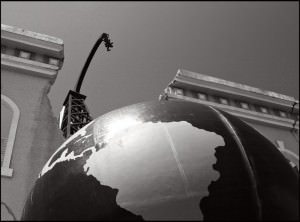Globalization is Eroding the Government’s Power from an Economic Perspective
Multiple factors are influencing the gradual emergence of a global economy in the 21st century
By: Exequiel Octavio Bertaina, Online Editor
Globalization in the contemporary world of politics has taken a particularly powerful form in recent decades, as innovations in communication, transportation, commerce and information technologies continue to generate new challenges to the dominance of a government over its economy. Even though the term globalization has existed for quite some time, it’s the intensity and scope of worldwide integration it has brought forward in the past two decades which makes this issue much more appealing. Without any signs of deceleration, these global forces keep transforming the social and economic landscapes in our societies. What’s alarming is that globalization has posed fundamental challenges to the traditional assumptions of economic and social equality, which clearly have weakened a government’s dominance and role within its borders.
A distinguishing feature of globalization is the emergence of supranational decision-making bodies such as the International Monetary Fund (IMF), the World Trade Organization (WTO) and the World Bank. These have become the most important institutions in economic affairs. The growing mobility of capital and free trade promote these supranational decision making organizations which, in return, reduce the control governments have over their economies. Undoubtedly, all of these factors put together have created greater social and economic inequalities due to the new realities of the market “laissez-faire” approach.
These organizations can be considered as shifting the role of the political authority from nation-states to global financial organizations. The government authorities are constrained by these supranational institutions as they heavily influence monetary and fiscal policy on a micro and macroeconomic level. Also, members of these organizations are required to abide by the rules and regulations governing international trade, which forces the governments to enact macro-decision based rules and guidelines imposed by these international organisations. It’s no secret that these governments are required to alter their convictions or procedures in order to satisfy the worldwide trade laws.
Hence, globalization is slowly accelerating the emergence of a single global economy and the power of a single government is undoubtedly diminishing (think of the United States and its diminishing influence). Interestingly, the state’s scope of action in these areas cannot solely be tamed by monetary or fiscal policies, as the global-market forces control most of the fundamental fluctuations such as the exchange rates (excluding to a certain extend the United States of America).
[pullquote]
… this process no longer unfolds within the geographic conception of where Army Men fought wars to nationalize those same territories centuries ago
[/pullquote]
Another aspect of globalization is the growing mobility of capital and the relative immobility of labour. If taxes, unwelcoming industrial policies, stiff environmental regulations are too costly or constraining, investors will pull up all stakes and transfer them elsewhere even if workers cannot move so easily. As John Gray points out: “global spreading of industrial production and new technologies encourag[es] unbridled capital mobility and unlimited trade liberty”. Therefore, the expected results of limiting taxation on producers will have to be shouldered by the labourers.
It also ties the hands of the political forces, even those whose ideological traditions support state intervention in production and redistribution. In this view, it hardly matters whether the left or the right is in power, as the restraints of the internationalized economy will oblige the ruling party to follow the same monetary and fiscal policies or else face a loss of national competitiveness and potential foreign investor opportunities.
One does not need to look through the lenses of international trade theories to see links between globalization and the shrinking of a country’s control over their economy. One of the deepest sources of concerns about financial market laissez-faire is whether the race to the bottom in wages jeopardizes old opportunities to be relocated at lower production cost countries.
Ultimately, the government’s fiscal policy is indirectly constrained by capital mobility, since taxes cannot be raised without negatively affecting the competitive advantage of its domestic producers. The likely outcomes of nation-states trying to avoid budgetary crisis by increasing taxes could lead to higher unemployment due to the intricacies of the global economy.
Undeniably, this is one of the principal sources of pressure that have forced cuts in social spending instead of increasing government revenue by the mean of taxation.
Interestingly, the primary political values required by the business markets are order, tranquility and freedom of free trade. None of these criteria invoke the need of citizenship, social justice or equality, which are necessarily promoted by the nation state. One much-noted reality is that firms can now operate across multiple borders with ease since that’s what the economic phenomenon of globalization is all about.
The growing numbers of economic activities are taking place in digital spaces since they override all existing territorial jurisdiction and operate under international market trade guidelines. Further, this growing virtualization of economic activity in the financial field amplifies the crisis of losing control of the country’s macroeconomic sovereignty.
What should not come as a surprise is that this process no longer unfolds within the geographic conception of where Army Men fought wars to nationalize those same territories centuries ago.
The decline of a country’s authority to act in many areas of life has led to the re-emergence of civil societies, which are gradually becoming significant players in the global governance. Global civil society is comprised of a broad range of organizations and associations from advocacy groups to trade unions and professional associations.
For many, the merging global civil society is gradually replacing the government as the defender of democratic values and principles. As the ability of national governments to influence decision making at the international and national level continues to erode, so does their capacity to protect the political and civil rights of their citizens. These non-governmental organizations are challenging traditional state-based notion of politics and are advancing the idea of a cosmopolitan democracy in which the members of different societies can come together as world citizens in a global political community.
Globalization has brought prosperity to those who follow its principles in some form, yet it has not been without costs. The gap between the rich and the poor has been increasing in developing countries, as outlined by Mr. Der Hoeven; increased demand for skilled workers, coupled with differences among countries in the growth of the supply of skilled workers, explains the increasing differences [in wage gaps]. The economic benefits of globalization have not necessarily ameliorated the welfare status of the poorer in these societies, since at its essence, low-skilled manufacturing is moving away from developed countries to maximize corporate profits.
This creates a strong economic pressure towards lower-skilled labour supply in the labour market of developed countries to remain competitive in the global economy. Hence, these competitiveness concerns can cause developed countries to limit wages and the generosity of new social insurance policies. Consequently, the government tries to avoid having steep minimum wages since the producers of goods and services could ultimately leave and establish the workshops in lower production cost countries.
[pullquote]It’s clear that globalization is fundamentally capable of affecting a country’s economy, creating social inequalities and even reducing the government’s power to act and influence.[/pullquote]
Also, the workers must accept the fact that they have to work at lower-than-expected wage rates in order to keep their job in the long-run. This leads to social inequality as the poorer live on tighter budget constraints, while the wealthier can increase their profits at the expense of the lower classes.
Consequently, the capacity of unions to organize and demand better wages in collective bargaining is severely limited because the producers can establish their factories elsewhere, and the government cannot force a producer to remain within its borders. This has been clearly pointed out by der Hoeven; he argues that “[there is] a massive trend worldwide towards “flexibility” of the labour force: trade unions [are] sidelined and coerced to toe the line”.
Likewise, individuals are required to have better skills than their predecessors. The lower-skilled jobs are moved to lower production cost countries. The more valuable and better paying jobs remain in developed countries, yet they require higher educated individuals. It’s only these types of individuals who can enjoy job opportunities with higher revenue. Consequently, there are fewer jobs in the lower-value-added part of the tradable sector and competition for similar jobs in the non-tradable sector has to increase as a direct side effect. Therefore, income growth is further depressed in the lower-value-added income sector. Wages must decrease as the supply of lower-skilled labour increases, while the demand for lower-skilled labour decreases.
However, arguments about the social consequences of globalization cannot be reduced to the simple view that globalization has disastrous consequences. Employment opportunities and income have indeed increased for many people in the developing countries that have adopted trade liberalization strategies due to Globalization. This has led to greater standards of living and workers earning greater incomes than they previously could have imagined. They might not have the same minimum standards of living as developed countries, but they have the opportunity for a better life.
This economic approach has allowed for a better understanding of the consequences globalization has brought forward to the governments. It’s clear that globalization is fundamentally capable of affecting a country’s economy, creating social inequalities and even reducing the government’s power to act and influence. Yet, globalization is not a new phenomenon and due to the rapid increase of information technology, communication, transportation and market laissez-faire, the government will continue to see its power eroded as countries continue to push for a global economy.
ARB Team
Arbitrage Magazine
Business News with BITE.
Liked this post? Why not buy the ARB team a beer? Just click an ad or donate below (thank you!)
Liked this article? Hated it? Comment below and share your opinions with other ARB readers!
































Share the post "Globalization is Eroding the Government’s Power from an Economic Perspective"